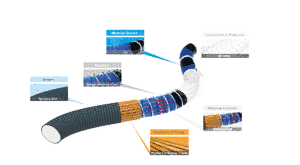
Intelligent, flexible and connected systems in products and production

Soft Material Robotic Systems by Prof. Dr.-Ing. Annika Raatz
Major robot manufacturers and trend scouts have been proclaiming a revolution in the role of robotics in our every lives. However, as the bars behind which industrial robots have been looming for long are being obliterated, images that may well originate in science fiction movies cross one’s mind. Only recently have robotics researchers begun to initiate a paradigm shift in the design of robotic systems, which may one day cause a change of mindset and provoke pictures of more human-friendly robots that harmlessly interact with us. With a deeper understanding of how soft-bodied animals achieve highly sophisticated and flexible behaviors through softness, such as the remarkable manual grasping ability exhibited by the octopus vulgaris, researchers are now translating their insights into the design of robotic systems that are made mainly of soft materials. This paradigm shift from stiff to soft is not limited to the need for novel approaches for the mechanical design of these robotic systems; it also presents challenges for the design of smart materials and components as well as for modeling and control.

Biography
Annika Raatz is Professor at the Institute of Assembly Technology at Leibniz Universität Hannover. She is the chairwoman of the board of Hannover Centre for Production Technology (PZH) in Garbsen and speaker of the board of the Hannover Center of Mechatronics. She is also member of the extended board of Cluster of Excellence PhoenixD. Her field of research includes soft robotics, human-robot-cooperation, underactuated handling and control systems and precision assembly. In the field of soft robotics, she coordinates the DFG priority programme SPP2100: Soft Material Robotic Systems
